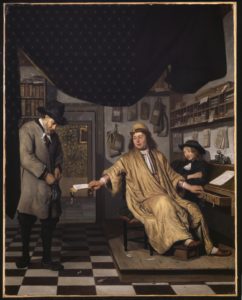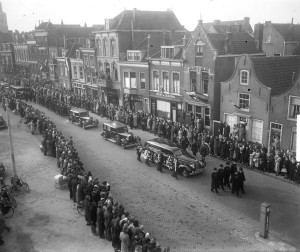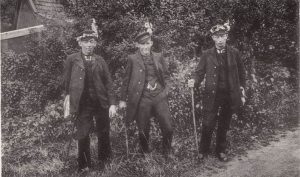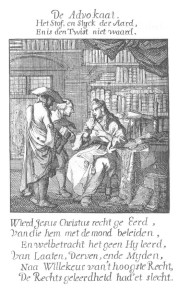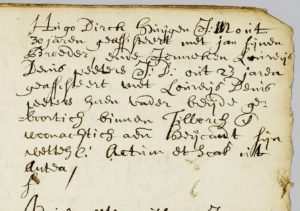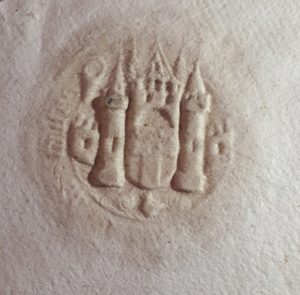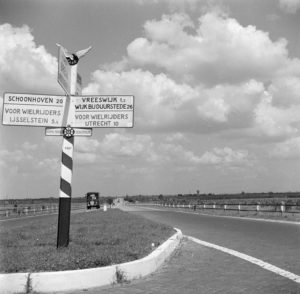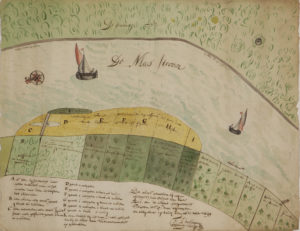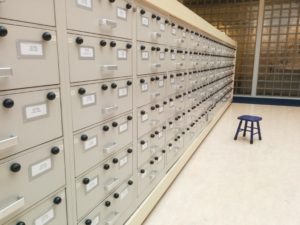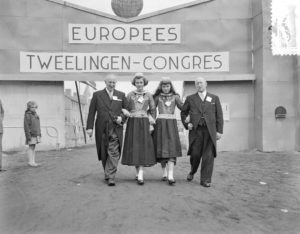A notaris is a notary. In many parts of the Netherlands, notaries were the record creators for many aspects of our ancestors' lives, for example when they wanted to draw up a prenuptial agreement, a contract to sell property, a work contract, or a will. See the article about notarial records for more information. … [Read more...]
Dutch term – Doodsoorzaak
The doodsoorzaak is the cause of death. Dutch civil registration death records don't record the cause of death. See How to find the cause of death for some other possibilities. … [Read more...]
Dutch term – Noaber
In the Low Saxon dialect spoken in the eastern parts of the Netherlands, a noaber is a neighbor. The duties of a noaber were quite extensive. When a new person moved into the neighborhood, they would expect to be invited for a strong drink. They would help with renovations of the house. During childbirth, female neighbors would assist the midwife and help take care of mother and child after birth. If a person died, the neighbors would help to dress the deceased and put him in his coffin. … [Read more...]
Dutch term – Naarderschap
"Naarderschap" is a term you may find in court records if somebody claims the right of first purchase because of kinship to the seller. They could purchase the property by matching the price that other buyers were willing to pay. See also Naastingsrecht. … [Read more...]
Dutch term – J.M. and J.D.
Two abbreviations you may often find in older marriage records are J.M. and J.D. "J.M." stands for Jonge Man, literally: young man. "J.D." stands for Jonge Dochter, literally: young daughter. They refer to the marital status of the person, indicating they are single and this is their first marriage. The word jong/young has no relation to their age. Sometimes, you find J.G. [Jong gezel, approximately: young journeyman or companion] instead of J.M., but the meaning is the same: a … [Read more...]
Dutch term – Broodzegel
A broodzegel (literally: bread seal) is an old way to seal documents using bread and paper. In the late Middle Ages, smaller wax seals were sometimes covered with paper to help preserve the imprint. Sometimes, bread or dough was used instead of wax. Such a seal would be called a broodzegel. Source: Photo and information from Stadsarchief Rotterdam Facebook post; citing 1-01_2162: Records relating to the case between Gorinchem, Schoonhoven and Rotterdam versus Dordrecht about … [Read more...]
Dutch term – Elders
Elders means "somewhere else." You can encounter the term in church records, court records, or notarial records, to indicate that somebody is absent, or in a phrase like elders getrouwd [married somewhere else]. … [Read more...]
Dutch term – Aanwas
Aanwas means increase. The term can often be found in reference to increase in land because of river deposits. Laws specified who owned the aanwas. Sometimes neighbors argued about the rights to the newly created land, for example if one property owner lost land because of erosion while his neighbor gained land due to deposits. These conflicts can create civil court records, sometimes including old maps showing the disputed land. … [Read more...]
Dutch term – Kaartenbak
A kaartenbak is a card catalog. Creating card catalogs was the popular way to index genealogical records before the computer age. Not all kaartenbakken have been made available online, so a quick survey of the available catalogs in a reading room is a good first step in a research plan. Archives often use one of three strategies to make this information available online: Using the card catalog for database entry. This creates a digital version of the catalog that is fully searchable. … [Read more...]
Dutch term – Tweeling
The Dutch word tweeling (literally: two-ling) means twins. Similarly, drieling means triplets, vierling means quadruplets, vijfling means quintuplets, and zesling means sextuplets. The word tweeling is used for the set of twins. There is no singular Dutch word for a twin. You can say "ik heb een tweelingbroer" [I have a twin brother], "ik heb een tweelingzus" [I have a twin sister] or a parent can say "ik heb een tweeling" [I have twins]. You can also say "Ik ben één van een tweeling" [I am … [Read more...]
